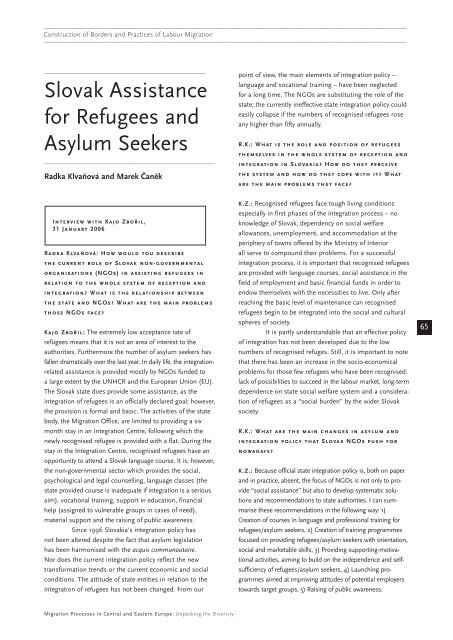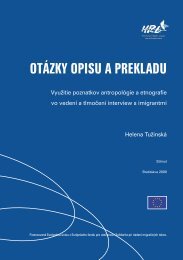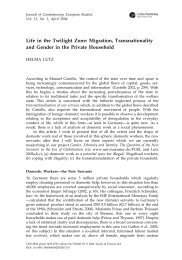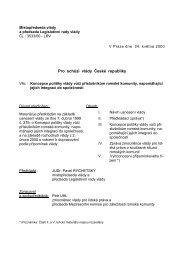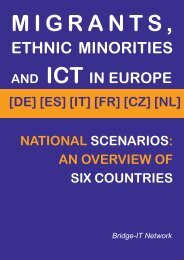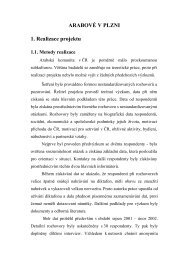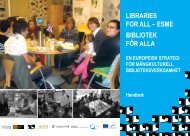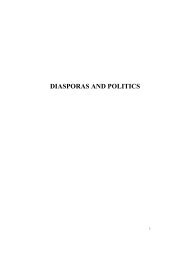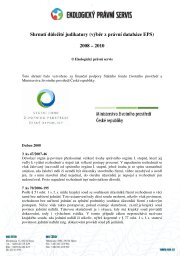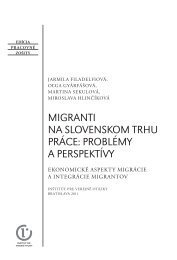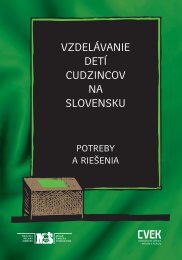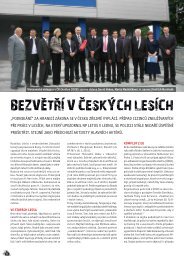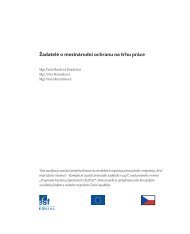Migration Processes in Central and Eastern Europe - Multiple Choices
Migration Processes in Central and Eastern Europe - Multiple Choices
Migration Processes in Central and Eastern Europe - Multiple Choices
You also want an ePaper? Increase the reach of your titles
YUMPU automatically turns print PDFs into web optimized ePapers that Google loves.
———————————————————————————————————————————————————————————————<br />
Construction of Borders <strong>and</strong> Practices of Labour <strong>Migration</strong><br />
———————————————————————————————————————————————————————————————<br />
————————————————————————————<br />
Slovak Assistance<br />
for Refugees <strong>and</strong><br />
Asylum Seekers<br />
—————————————————————————————<br />
Radka Klvaňová <strong>and</strong> Marek Čaněk<br />
po<strong>in</strong>t of view, the ma<strong>in</strong> elements of <strong>in</strong>tegration policy –<br />
language <strong>and</strong> vocational tra<strong>in</strong><strong>in</strong>g – have been neglected<br />
for a long time. The NGOs are substitut<strong>in</strong>g the role of the<br />
state; the currently <strong>in</strong>effective state <strong>in</strong>tegration policy could<br />
easily collapse if the numbers of recognised refugees rose<br />
any higher than fifty annually.<br />
R.K.: What is the role <strong>and</strong> position of refugees<br />
themselves <strong>in</strong> the whole system of reception <strong>and</strong><br />
<strong>in</strong>tegration <strong>in</strong> Slovakia? How do they perceive<br />
the system <strong>and</strong> how do they cope with it? What<br />
are the ma<strong>in</strong> problems they face?<br />
Interview with Kajo Zbořil,<br />
31 January 2006<br />
Radka Klvaňová: How would you describe<br />
the current role of Slovak non-governmental<br />
organisations (NGOs) <strong>in</strong> assist<strong>in</strong>g refugees <strong>in</strong><br />
relation to the whole system of reception <strong>and</strong><br />
<strong>in</strong>tegration? What is the relationship between<br />
the state <strong>and</strong> NGOs? What are the ma<strong>in</strong> problems<br />
those NGOs face?<br />
Kajo Zbořil: The extremely low acceptance rate of<br />
refugees means that it is not an area of <strong>in</strong>terest to the<br />
authorities. Furthermore the number of asylum seekers has<br />
fallen dramatically over the last year. In daily life, the <strong>in</strong>tegrationrelated<br />
assistance is provided mostly by NGOs funded to<br />
a large extent by the UNHCR <strong>and</strong> the <strong>Europe</strong>an Union (EU).<br />
The Slovak state does provide some assistance, as the<br />
<strong>in</strong>tegration of refugees is an officially declared goal; however,<br />
the provision is formal <strong>and</strong> basic. The activities of the state<br />
body, the <strong>Migration</strong> Office, are limited to provid<strong>in</strong>g a six<br />
month stay <strong>in</strong> an Integration Centre, follow<strong>in</strong>g which the<br />
newly recognised refugee is provided with a flat. Dur<strong>in</strong>g the<br />
stay <strong>in</strong> the Integration Centre, recognised refugees have an<br />
opportunity to attend a Slovak language course. It is, however,<br />
the non-governmental sector which provides the social,<br />
psychological <strong>and</strong> legal counsell<strong>in</strong>g, language classes (the<br />
state provided course is <strong>in</strong>adequate if <strong>in</strong>tegration is a serious<br />
aim), vocational tra<strong>in</strong><strong>in</strong>g, support <strong>in</strong> education, f<strong>in</strong>ancial<br />
help (assigned to vulnerable groups <strong>in</strong> cases of need),<br />
material support <strong>and</strong> the rais<strong>in</strong>g of public awareness.<br />
S<strong>in</strong>ce 1996 Slovakia's <strong>in</strong>tegration policy has<br />
not been altered despite the fact that asylum legislation<br />
has been harmonised with the acquis communautaire.<br />
Nor does the current <strong>in</strong>tegration policy reflect the new<br />
transformation trends or the current economic <strong>and</strong> social<br />
conditions. The attitude of state entities <strong>in</strong> relation to the<br />
<strong>in</strong>tegration of refugees has not been changed. From our<br />
K.Z.: Recognised refugees face tough liv<strong>in</strong>g conditions<br />
especially <strong>in</strong> first phases of the <strong>in</strong>tegration process – no<br />
knowledge of Slovak, dependency on social welfare<br />
allowances, unemployment, <strong>and</strong> accommodation at the<br />
periphery of towns offered by the M<strong>in</strong>istry of Interior<br />
all serve to compound their problems. For a successful<br />
<strong>in</strong>tegration process, it is important that recognised refugees<br />
are provided with language courses, social assistance <strong>in</strong> the<br />
field of employment <strong>and</strong> basic f<strong>in</strong>ancial funds <strong>in</strong> order to<br />
endow themselves with the necessities to live. Only after<br />
reach<strong>in</strong>g the basic level of ma<strong>in</strong>tenance can recognised<br />
refugees beg<strong>in</strong> to be <strong>in</strong>tegrated <strong>in</strong>to the social <strong>and</strong> cultural<br />
spheres of society.<br />
It is partly underst<strong>and</strong>able that an effective policy<br />
of <strong>in</strong>tegration has not been developed due to the low<br />
numbers of recognised refuges. Still, it is important to note<br />
that there has been an <strong>in</strong>crease <strong>in</strong> the socio-economical<br />
problems for those few refugees who have been recognised:<br />
lack of possibilities to succeed <strong>in</strong> the labour market, long-term<br />
dependence on state social welfare system <strong>and</strong> a consideration<br />
of refugees as a “social burden” by the wider Slovak<br />
society.<br />
R.K.: What are the ma<strong>in</strong> changes <strong>in</strong> asylum <strong>and</strong><br />
<strong>in</strong>tegration policy that Slovak NGOs push for<br />
nowadays?<br />
K.Z.: Because official state <strong>in</strong>tegration policy is, both on paper<br />
<strong>and</strong> <strong>in</strong> practice, absent, the focus of NGOs is not only to provide<br />
“social assistance” but also to develop systematic solutions<br />
<strong>and</strong> recommendations to state authorities. I can summarise<br />
these recommendations <strong>in</strong> the follow<strong>in</strong>g way: 1)<br />
Creation of courses <strong>in</strong> language <strong>and</strong> professional tra<strong>in</strong><strong>in</strong>g for<br />
refugees/asylum seekers, 2) Creation of tra<strong>in</strong><strong>in</strong>g programmes<br />
focused on provid<strong>in</strong>g refugees/asylum seekers with orientation,<br />
social <strong>and</strong> marketable skills, 3) Provid<strong>in</strong>g support<strong>in</strong>g-motivational<br />
activities, aim<strong>in</strong>g to build on the <strong>in</strong>dependence <strong>and</strong> selfsufficiency<br />
of refugees/asylum seekers, 4) Launch<strong>in</strong>g programmes<br />
aimed at improv<strong>in</strong>g attitudes of potential employers<br />
towards target groups, 5) Rais<strong>in</strong>g of public awareness.<br />
65<br />
<strong>Migration</strong> <strong>Processes</strong> <strong>in</strong> <strong>Central</strong> <strong>and</strong> <strong>Eastern</strong> <strong>Europe</strong>: Unpack<strong>in</strong>g the Diversity


